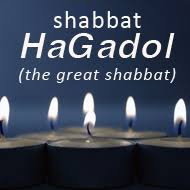Here is some material posted in advance of שבת הגדול in years past.

We're just a couple of hours from שבת הגדול. My daughter thought that it was שבת הגדה, which is not that far off, as one of the only minhagim for the day is to say a portion of the Hagada on שבת afternoon. (It also makes a nice parallel to the commonly misstated שבת תשובה.) You might also have thought that it got its name from the other minhag - that the Rav (or Gadol) gives a דרשה - a lengthy talk usually divided between lomdus, halacha and hashkafa. Really it is called שבת הגדול - "the Great Shabbat" - because it is when the great miracles started in Mitzrayim. That year, the 10th of Nissan, when the Jews took the קרבן פסח into their home while the angry Egyptian could do nothing but watch, was on שבת.
It is curious that we celebrate it on the day of the week (like Thanksgiving or Memorial Day), rather than celebrating the calendar date - like all other significant days in Jewish life. The באר היטב asks the question, and points us to the חוות יאיר (I assume), which I haven't had a chance to look up yet. If anyone knows the answer, please let me know.
And a response from Tzipporah Herzfeld:
So I don't know if this is the answer, but I read something that Rabbi Yossi Marcus wrote online that the 10th of Nissan, when we should be celebrating the mitzvah of the korban Pesach, was also the date that Miriam died. So we celebrate the mitzvah of the korban on the Shabbos before Pesach because the 10th of Nissan was established as an unofficial fast day to commemorate Miriam's death, therefore we shouldn't be celebrating anything on that day.
And the post-script:
- On the advice of our lunch guest, I found Tzipporah's answer to Friday's question in the ערוך השולחן. He also gives another answer: The splitting of the Yarden, a lesser miracle, also took place on י' ניסן, and we don't want to dilute the celebration of the miracles of מצרים by adding other miracles. It was apparently quite a day. It's interesting that we don't find a similar concern for אבילות on Tisha B'av or י"ז תמוז, where we have many reasons for mourning, some more powerful than others. Even at the ליל הסדר, we associate the night with other historical miracles that occurred through the generations - see ויהי בחצי הלילה.
- An anonymous student also pointed out that the Drasha by the Rabbi (= Gadol) is one of the suggested reasons for the name שבת הגדול.
- Rabbi Zev Rifkin, a local Rosh Kollel spoke about בדיקת חמץ. He asked, no matter how good a בדיקה we do, it's not fully sufficient - are we re-examining the oven? So he defended the current "minhag" of doing only a cursory / ceremonial search, and says that once we have spent weeks cleaning and searching for chametz, all of the rooms in our home are בחזקת בדוק, and no longer require בדיקה at all. If so, how do we justify our ברכה? Isn't it לבטלה? Therefore, he said that it is appropriate to leave a small section of your home uncleaned at all (a cabinet, a knapsack etc.), and do that during בדיקת חמץ, in addition to the charade of finding the 10 pieces of chametz that are set out. I mean to check with other Rabbanim to see if this is a mainstream view.
No comments:
Post a Comment